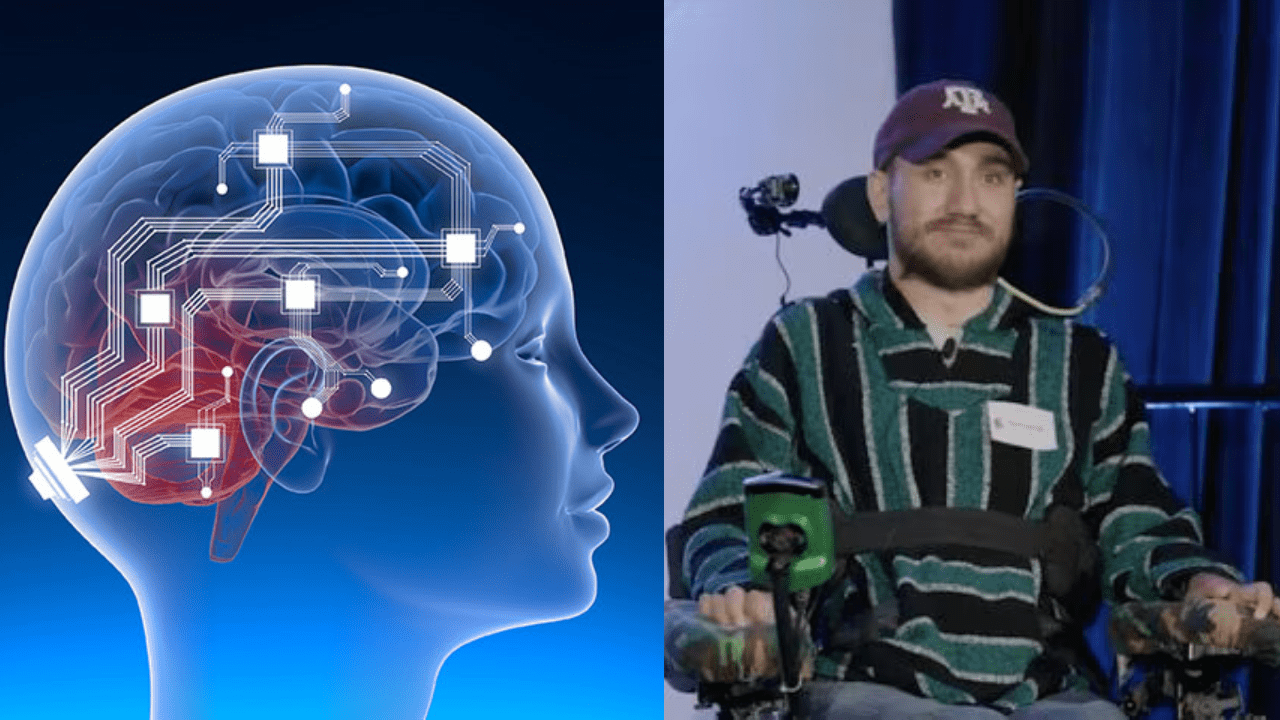Neuralink’s Milestone Moment Halts – First Brain Chip Implant Hits Roadblock, Reveals Challenge Ahead!

Neuralink’s groundbreaking venture into brain-computer interface technology has hit a snag, as the company disclosed issues with the chip implanted in its first human patient, Noland Arbaugh. Despite initially showcasing remarkable capabilities, including Mr. Arbaugh’s ability to control video games using his mind, the implant encountered setbacks a few weeks post-surgery.
The crux of the issue lies in the retraction of some threads within the implant, resulting in a reduction in the amount of data received by Neuralink’s system. This setback significantly impacted the device’s speed and accuracy in measuring neural signals, prompting the company to implement modifications to mitigate the effects.
Neuralink responded swiftly by refining its recording algorithm, enhancing signal translation techniques, and improving the user interface. These adjustments yielded a notable improvement in bits per second (BPS), surpassing Mr. Arbaugh’s initial performance and ensuring continued functionality of the system.
Neuralink’s First Brain Chip Faces Unexpected Setback
Despite the challenges posed by thread retraction, Mr. Arbaugh continues to utilize the Neuralink system extensively, clocking in around eight hours per day during the week and up to 10 hours per day on weekends. While the issue was reported by Mr. Arbaugh himself, Neuralink assured that it did not pose a direct safety risk to him.
The transparency of Neuralink’s disclosure is notable, particularly in light of inquiries from the Wall Street Journal (WSJ) regarding the problem. Although the prospect of removing the implant was considered, Neuralink remains committed to addressing the issue and optimizing the device’s performance.
Neuralink’s journey, marked by both breakthroughs and challenges, underscores the complexities inherent in developing cutting-edge neural interface technology. While setbacks are inevitable in pioneering endeavors of this nature, Neuralink’s dedication to innovation and continuous improvement bodes well for the future of brain-computer interfaces.
The live video stream featuring Mr. Arbaugh in March provided a glimpse into the promising potential of Neuralink’s technology, despite the subsequent complications. With ongoing advancements and refinements, Neuralink remains at the forefront of revolutionizing the relationship between humans and technology, paving the way for unprecedented possibilities in the realm of neuroscience and beyond.
Related FAQs
Neuralink is a neurotechnology company founded by Elon Musk with the goal of developing brain-computer interface (BCI) technology. The company aims to create devices that can directly link the human brain with computers, enabling two-way communication. This technology has the potential to treat neurological conditions, restore sensory and motor functions, and even enhance cognitive abilities.
Neuralink’s technology involves implanting tiny electrodes, called “threads,” into the brain to record neural activity and stimulate neurons. These electrodes are connected to a small device implanted behind the ear, which communicates wirelessly with external devices such as computers or smartphones. Applications of Neuralink’s technology range from medical uses, such as treating paralysis and Parkinson’s disease, to non-medical applications like controlling electronic devices with the mind or augmenting cognitive abilities.
The development of brain-computer interface technology raises several ethical and privacy concerns. One major concern is the potential for misuse of the technology, such as invasion of privacy, unauthorized access to neural data, or even manipulation of thoughts and behaviors. There are also questions about consent and the long-term effects of implanting devices into the brain. Additionally, there are broader societal implications, including issues related to equity and access to technology, as well as the potential for exacerbating existing inequalities. Neuralink and similar companies must address these concerns through transparent communication, rigorous ethical guidelines, and robust privacy protections.
Also Read:

The Psychology of Love: Why Valentines Day Matters More Epic Than You Think
Discover the psychology of love and why Valentines Day is more important than you think. Learn how love impacts the brain, strengthens relationships, and boosts

Premier League Highlights: Arsenal Humiliate Man City 5-1, Spurs and Palace Secure Crucial Wins
Arsenal demolished Manchester City 5-1 in a statement premier league highlights win, reigniting their title hopes. Meanwhile, Crystal Palace stunned Man United 2-0, and Tottenham

How Budget 2025 Impacts the Indian Middle-Class: Major Tax Benefits and Glaring Omissions
Budget 2025 offers major tax relief to the middle class, including zero tax on incomes up to ₹12 lakh. However, it misses out on incentives

Degrees vs Employability: Why “Highly Qualified Degree Holders” Struggle to Find Jobs While “Less Qualified Individuals” Get Hired Faster!
Many highly qualified individuals struggle to secure jobs, while less qualified candidates get hired quickly. This Degrees vs Employability paradox is caused by employer preferences,

The Power of Mindset: Why Looking Poor Doesn’t Make You Poor, but Thinking Poor Does!
Discover why looking poor doesn’t define your wealth but thinking poor does. Learn the power of mindset and how a growth-oriented mindset can lead to

Overthinking: How It’s Damaging Today’s Youth – Causes and Cure in 2025
Understanding how overthinking is silently damaging today’s youth, from its causes rooted in societal pressure and social media to its long-term effects on mental health.
